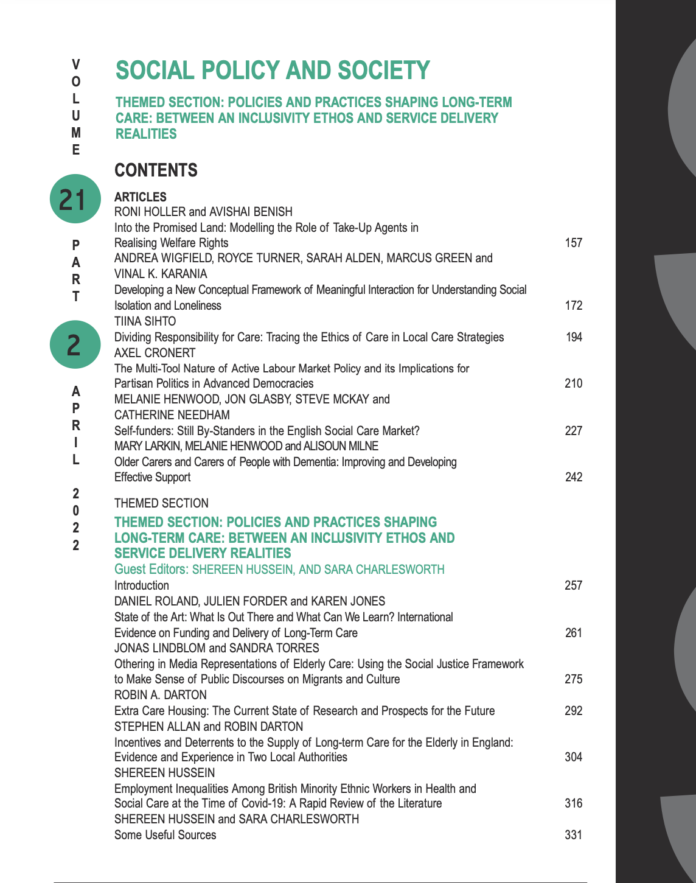MENARAH network lead, Professor Shereen Hussein and Professor Sara Charlesworth, at the RMIT University, Guest edited a new Themed Section in the Journal of Social Policy and Society. The Themed Section includes five articles in addition to the introduction and some useful resources.
Professors Hussein and Charlesworth write that ‘population ageing has been rapidly increasing in most of the developed world. However, healthy life expectancy has not been growing at a similar pace, resulting in an expansion in the number of years older people live with health and care needs. Long-term care (LTC) provision is diverse across Europe and more economically developed countries with input from different actors and agencies ranging from informal family carers, the state, and, increasingly, migrant workers. Nevertheless, the ethos of LTC policies in the UK, Europe, Australasia and North America are informed by person-centeredness, independence, and inclusion philosophies.‘ They highlight the core principles of long-term care services as being person-centred and aiming to maintain people’s independence and dignity. Globally, LTC delivery has been progressing towards ageing in place, where support is intended to enhance people’s ability to continue living independently at home for as long as they wish. However, various challenges exist in delivering high-quality LTC, including funding pressures, workforce shortages and national welfare discourses including ageist perspectives.
Hussein and Charlesworth bring to the forefront the impact of COVID19 on the delivery of LTC services. They write: ‘The Covid-19 pandemic has thrown an intense light on the LTC sector for all the wrong reasons: from high infection levels and death rates in care settings, mainly residential care, to evidence of failure to protect the LTC workforce with fragmented and contradictory guidelines and delays in or inadequate supplies of personal protection equipment and training. The significant effects of Covid-19 combined with a long-standing multiplicity of challenges – including many related to funding, ensuring diverse and adequate services, and resourcing a well-trained and supported workforce – call to understand the granularities of the different facets of LTC provision. In this themed section, we bring together a selection of articles from leading authors in LTC research from the UK and Europe’.
The collection of articles in this Themed Section engages with the complexities of implementing LTC policies within explicit and implicit sets of constraints, which create direct and indirect pressures on LTC providers, LTC workers, and informal carers.
A list of articles in the Themed Section:
Shereen Hussein, Sara Charlesworth
Published online by Cambridge University Press: 01 March 2022, pp. 257-260
Daniel Roland, Julien Forder, Karen Jones
Published online by Cambridge University Press: 06 October 2021, pp. 261-274
Published online by Cambridge University Press: 30 April 2021, pp. 275-291
4- Extra Care Housing: The Current State of Research and Prospects for the Future
Published online by Cambridge University Press: 11 November 2021, pp. 292-303
Published online by Cambridge University Press: 04 October 2021, pp. 304-315
Published online by Cambridge University Press: 01 March 2022, pp. 316-330
Shereen Hussein, Sara Charlesworth
Published online by Cambridge University Press: 01 March 2022, pp. 331-332
Founder and Director
Shereen Husseinis a Health and Social Care Policy professor at the London School of Hygiene and Tropical Medicine (LSHTM), United Kingdom.
Shereen Founded the MENARAH Network in 2019, through an initial grant from the Global Challenge Research Fund, UKRI. She is a medical demographer with expertise in ageing, family dynamics, migration and long-term care systems. Shereen regularly collaborates with the United Nations, the World Health Organisation and the World Bank in policy and research focused on ageing in the Middle East and North Africa Region.
Shereen received her undergraduate degree in statistics and a postgraduate degree in computer science at Cairo University. She completed an MSc in medical demography at the London School of Hygiene and a PhD in quantitative demography and population studies at the London School of Economics and Political Science, United Kingdom.



